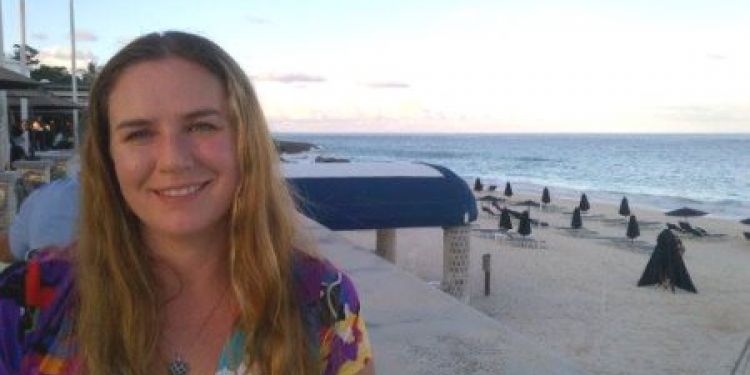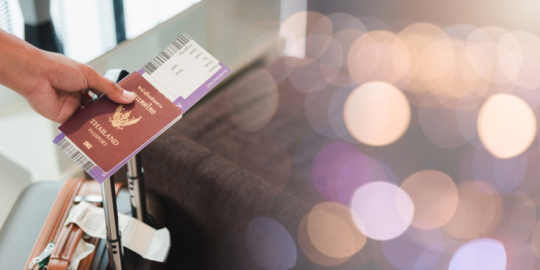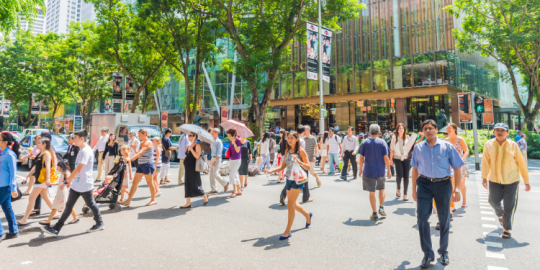My name is Jenny and I am Canadian. I grew up in a small town in Saskatchewan called Hazenmore. By small I mean the census one year recorded the population at 47. I went to University in Edmonton, Alberta and stayed there for almost 17 years before I became an expat.
When and how did you decide to move to Bermuda?
I came for a one week vacation on the island, which promptly became only 5 days because a hurricane got here first and all airlines cancelled flights for 2 days. Once I arrived, I immediately fell in love with the smell of flowers in the air, the pink sand beaches, and the chirping of tree frogs in the fresh air of the quiet nights. I returned to Edmonton that week, but Bermuda literally tugged at my soul. I was haunted by the sound of the waves on elbow beach and the tree frogs singing at night. I started downsizing my city life while I checked online for job opportunities in my field daily. It took 4 months for a job listing to pop up, 2 months to get through the interview and hiring process, and another 5 months to get the work visa from Bermuda Immigration. It sounds like a long time, but there are a lot of opportunities for expats in Bermuda if you are willing to wait and go through this process.
Is
it complicated to settle down there?
Settling down is not hard, but there are certainly many things that were different from home. Convenience is one thing. I found it took 6 months to really get set up. It was not uncommon to call and find out how to do something, arrange a day and transportation to do it, arrive, and be told you cannot do that today. In addition to driving on the left side of the road, international drivers licenses are not accepted, where you live determines if you can even have a car, and opening a bank account not only requires proof of employment, but you may need a letter of good standing from a bank in your country of origin, your passport, and your work permit all on your person that day. They may or may not have mentioned all of that when you called earlier. The hookup for services like cable requires you to be at home, and that service is notorious for taking weeks to actually turn into reality, although that may just be true with cable service almost anywhere. Rent is also different, there are very few apartment buildings but abundant multi-unit homes available for rental. Many leases require you to paint the apartment when you go. As well, the only water you have is that you are blessed with from rain running from your roof to the tank below your apartment, so asking about your water tank, whose responsibility it is to buy water if you run out, and if there is a generator in the event of power losses is part of the normal negotiations. So not complicated, but different as well.
Have you ever lived abroad before? How many countries have you visited?
This was my first expat experience. I have visited Belize a few times, Mexico, Nicaragua, Roatan, but other than that my travel has been to the United States or within Canada. North America is so big it can take up countless vacations on its own - I have mountain biked my way through many weekends in Jasper and Banff, which eventually lead me to Waterton, Glacier, and Yellowstone National Parks and Moab, Utah. I have been skiing Jasper at, Banff, Fernie, Kimberly, Invermere and Canmore. I did some skydiving in Arizona, California, Montana, Alberta, Belize, and Nicaragua. I did a road trip from Edmonton, Alberta to Disneyland, Los Angeles, and back up the West Coast to Vancouver and Alberta just to break in my new car once. And I have played tourist in Cozumel, Roatan, Dominican Republic, Boston, New York, Miami, Vancouver, Ottawa, Montreal, Niagra Falls, and St. John's. There is a lot to see in the world, and a lot of it is in my own backyard in Canada.
What do you like the most about Bermuda?
I like the smallness of it. I enjoy riding my scooter at the maximum speed of 35 km/h, and I am especially fond of my 4 minute commute to work. I love the sound of the tree frogs on summer nights, the scent of oleander in the air, and the nature that is readily available, be it a beach, foliage, lizards, birds, fish, or the many wild chickens that roam the island with a string of fuzzy baby chicks in tow.
How is/was the cultural shock? What are the main differences with Canada, your home country?
The culture shock was not too bad. I have lived in small places before. What stands may not be a huge part of daily life here, but it was the one difference that was most shocking. It is the strong sense of nationalism, which sometimes unfortunately leads to discrimination. By Nationalism I mean that Bermuda protects its naturalized citizens and their opportunities above those who reside here but are not citizens. There are specific legal categories (if that is the right term) that give different privileges to Bermudian citizens, Spouse of a Bermudian, Permanent Resident Holders, and Guest Workers. On paper this mostly relates to employment and property ownership - some examples include that a Bermudian who marries a non-Bermudian used to need a special licence for their spouse in order to buy property, which essentially ensures that the property will not cross over into the non-Bermudian's hands through the marriage. Certain properties are only available for sale to Bermudians. As a guest worker, even if you could afford to buy a property, it is next to impossible to do so. The spouse of a Bermudian does not gain the right to vote until they have been married more than 10 years. An employer must hire a Bermuda who has the minimum requisites over a spouse of a Bermudian, and Permanent Resident Holder, and lastly the guest worker even if the latter have more experience. Therefore guest workers must have their jobs advertised every 2-3 years and will only be granted a renewal if the other categories do not produce an applicant who could do the job. While these rules make sense on some levels, it also makes it very tricky for people who do not fit nicely into these categories. For example a child born to 2 permanent resident holders does not gain Bermudian status and cannot stay when they become an adult, but a child born out of wedlock with one Bermudian parent will have residency status, but the foreign parent only gains additional right to stay and work until the child is 18, and then they return to guest worker status. Ironically this government sanctioned classification of local vs foreign seems to have built up animosity in a small sector of the very population they are set up to protect. There can be a very verbal opposition to foreign workers that is voiced through the unions, one of the political parties, the daily media, and sadly these trickle down into every day life, and morph into racism. The political correctness and "melting pot" of Canadian culture left me a little unprepared for the more raw racial discussions of Bermuda and how integral playing into those emotions is for the battling political parties. However, as a guest worker, I came knowing these rules and fully accepting them, with the intent to stay and enjoy the beauty of the island for a finite period of time.
As I said at the beginning though, this affects you only in a small way, and it is also very important to note that Bermuda is known for being friendly - I have truly met some of the most incredible people here, people who come from all of the above categories, who will all be forever friends, and who all have on one occassion or another proven to be persons of the most generous and gentle spirits imaginable. So don't worry too much about it, just know it is part of this experience too.
Do you miss anything from your homeland?
Only friends and family. I am otherwise too busy enjoying my life here. There is the occasional item one misses and you beg friends to bring back. For one of my coworkers, it was Shreddies cereal, another it was Eatmore chocolate bars, for others it is any type of fast food. For me it was getting the Canadian veterinary formula of cat food for my cat who wouldn't settle for anything less. Every visitor I had was required to pay a toll of cat food, which led to some interesting customs experiences at the airport. One friend's husband, who did not want to bring 20 pounds of cat food in the first place, was pulled aside by customs as asked why he had so much cat food yet obviously no cat. "Talk to the wife", he said, "she's the one with the weird hippie cat lady friend". For the record, I am not a hippie.
Any 'memories of an expat' you would like to share with us? Your best souvenir? Or maybe your worst experience?
My best memories of being and expat are also my best souvenirs. Friends, photos, and memories themselves. Friendships grow faster and with deeper roots when you find yourselves uprooted from the world you were in. I quickly made friends who became like family here. My photographs are intertwined with most memories as the camera and I have been inseparable on days off for the last couple of years. And of course the memories themselves... the sound of tree frogs still soothes my soul, and the scent of oleander now makes me think "home".
What does your typical day as an expat in Bermuda look like?
The typical day here has a lot of similarities to a day anywhere else in the world. I wake up, I go to work, and I try to get some living in during the afterhours. The differences are that instead of driving a car, I drive a 125 cc motorcycle. I never worry about a delay to work due to an overnight mini-blizzard, snow, or ice. My commute is a stable 4 minutes, winter or summer. I was expected to work in blizzards in Canada, but sometimes we get to stay home during hurricanes here. When I play volleyball here, it's on the beach instead of inside, and if I go for a jog I am distracted by passing birds and lizards on the trail instead of traffic by the sidewalk, and I can get to a path like that in a few minutes of the jog without having to drive there first. After hours in Bermuda tends to be a little more luxurious than home was. I own many more dresses, shoes, and purses than I ever did before, and you are just as likely to be having champagne with someone as a beer on your Friday night. Obviously there is the beach and boating opportunities that I did not have access to before that I enjoy very much here on days off.
When and why did you start your blog?
I started blogging in October, 2013. Several friends were thinking about visiting the island. Several other friends who had previously visited would often comment on photos asking where it was and why we didn't go when they were here. So I started the blog as a bit of a visitor's guide so that they would know more about what the island had to offer, and which places they wanted to see most when they came. It also gave me a way to catalogue my experiences like a journal, to share my favorite photos, and to give far away friends a bit better update of what I have been doing than a simple short Facebook update.
Did you make new friends with your blog?
I have exchanged a chats with people who have sent emails, opened hangouts, or asked for information in any way. I follow a few other bloggers' adventures, but have not met anyone new in person as a result of the blog.
Why did you register on
https://www.expat.com and what do you think of the website?
I realized early into the process that a lot of the initial blogs explained a lot, since they had my friends who would be first time visitors in mind. I was looking at ways to increase traffic, but when I came across https://www.expat.com, I realized it would have been nice to have known some of the things I have learned in advance and this was the perfect place to share those experiences.
Which advice would you give to the other Expat blog members who would like to settle in Bermuda?
Be patient. Things take longer than usual down here. It may take weeks or months to be offered an interview, and many more months before you are actually cleared to come to the island. You must do things by the letter, so do not jump the gun and quit your current job thinking you will be here in a few weeks. It will be months. When you arrive, be patient. It often takes several attempts to get the little things done, and patience is your only option. Accept that you are not likely going to stay forever. Your work permit is only renewable so long as the position cannot be filled locally at the time of its completion. Many people get renewed over and over, but there is no guarantee. So know this, and enjoy the experience!










